History of the Illinois State Treasurer
The office of the Illinois State Treasurer predates Illinois Statehood, tracing its roots to the early days of the Republic.
With the defeat of the British by American revolutionaries in 1783, and subsequent Peace of Paris that same year, large swaths of territory in the interior, from the Mississippi River in the West to the frontiers of the original thirteen colonies along the Appalachian Mountain range, were opened to westward expansion by the nascent democracy.
The Northwest Territory was incorporated in 1787 and included all of present day Ohio, Indiana, Michigan, Illinois, and Wisconsin, and the Northeastern section of Minnesota. After Ohio was admitted into the Union in 1800, the remainder of the area fell under the Indiana Territory, which was further subdivided into the Michigan Territory (1805) and the Illinois Territory (1809). Throughout this period the treasurer oversaw the assets of the territory. This office continued under the Illinois Territory, and was enumerated in the original state constitution in 1818.
Since gaining statehood, 74 people have served as the Illinois State Treasurer…
Since gaining statehood, 74 people have served as the Illinois State Treasurer. Only one woman has served as State Treasurer, Judy Baar Topinka, who served the longest term in the office’s history for twelve years, from 1995-2007. Seventy State Treasurers have been elected either by the legislature or the public, four were appointed by the Governor.
Until 1848, Treasurers were appointed to a two year term by a vote of the General Assembly. The 1848 Illinois constitution changed that, and gave the citizens of Illinois the right to elect the Treasurer. In 1954, the length of the term served by the Treasurer was lengthened from two years to four years. In 1970, the election year in which the Treasurer was chosen was moved to line up with the other Illinois Constitutional officers.
The role of the State Treasurer has evolved over the years as the U.S. and Illinois modernized from a largely agrarian economy in the early 1800s, through the era of industrialization and urbanization, into the modern world of the globalized and interconnected capital economy of today.
In the early days of the office, the State Treasurer’s primary responsibility was to be custodian of a strongbox where the states’ funds were kept. State funds could be loaned out by the Treasurer, who was allowed to keep the interest as personal income. In the early 20th Century, state law changed to require that State Funds be deposited into banks. As our system of Government and Finance evolved, more checks and balances were put into place to ensure better record keeping, accountability, and transparency.
Since 1970, the Treasurer’s office has engaged the public on issues of financial literacy, and has helped spur investment and growth in Illinois communities through targeted loan programs. The Treasurer’s office oversees the State’s 529 College Savings programs, and most recently, the Treasurer’s office administers the Illinois Technology Development Account, a venture capital fund aimed at developing technology firms in the State. The Treasurer’s office also manages the State’s unclaimed property.
Today, the office of the State Treasurer serves as custodians of the public funds, the chief investment officer of the state, and the state’s top banker.
Those who served as Illinois’ Treasurer reflect the long and storied history of our great State. Treasurer John Smith was a Brigadier General in the Civil War, serving as Treasurer before becoming Illinois’ 24th Lt. Governor. William Stratton served as Treasurer before becoming the youngest Governor in the country at the time. Adlai Stevenson III was Treasurer before he went on to serve in the U.S. Senate, as did Alan Dixon. Judy Baar Topinka was the first woman elected to Treasurer, and the first woman to be elected to two separate constitutional offices.
Michael Frerichs
2015-Present
A Certified Public Finance Officer, former Champaign County auditor and former state senator representing East Central Illinois, Treasurer Michael Frerichs is committed to restoring integrity and transparency to state government. As the state’s chief investment officer, Treasurer Frerichs will leverage our investments to not only earn strong returns for taxpayers but also create good-paying jobs that help families and communities rebuild the American Dream.
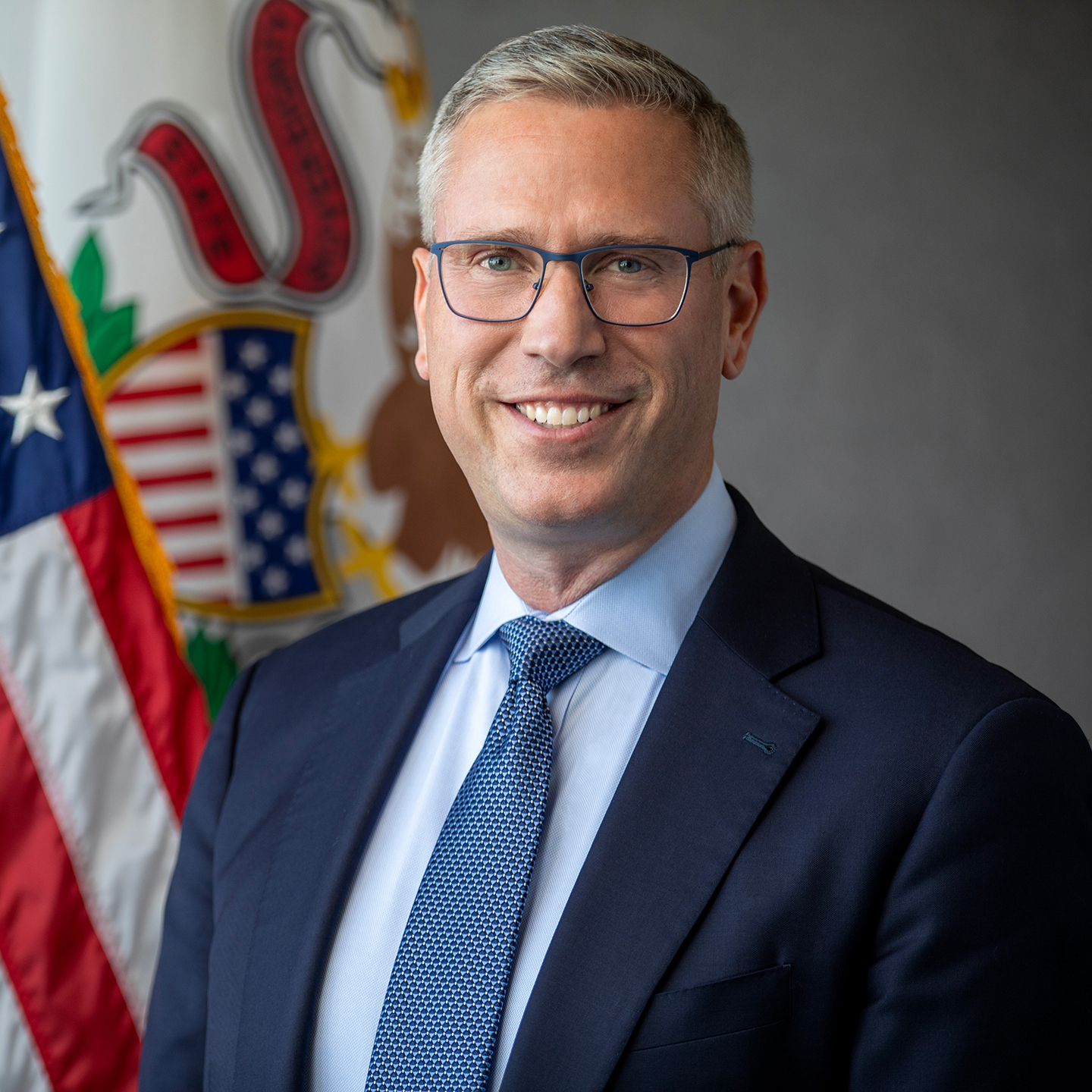
(2011-2015)
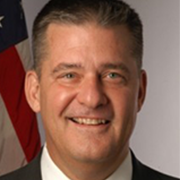
Dan Rutherford
Dan Rutherford was born in Pontiac, Illinois. Rutherford attended Illinois State University, and worked at the ServiceMaster Company. Prior to his term as Treasurer, he served as a Republican member of the Illinois Senate, representing the 53rd district, from 2003 to 2011, and in the Illinois House of Representatives from 1993 to 2003. He successfully ran for State Treasurer in 2010, and served a single term before an unsuccessful run at Governor in 2014.
(2007-2011)
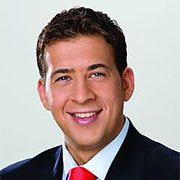
Alexi Giannoulias
Alexi Giannoulias was born in Chicago to Greek immigrants. Giannoulias attended The Latin School of Chicago and then the University of Chicago before transferring to Boston University to play basketball. Giannoulias graduated cum laude with a bachelor’s degree in economics and then moved to Greece to play semi-professionally. From 2002 to 2006, Giannoulias worked at Broadway Bank, a local community bank founded by his father. In 2006, he won the election of Illinois Treasurer, becoming the youngest state treasurer in the nation at the age of 30. He served a single term. In 2010, Giannoulias lost his bid for U.S. Senate.
(1995-2007)
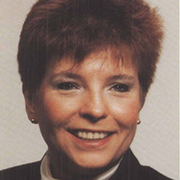
Judy Baar Topinka
Judy Baar Topinka was born in Chicago 1944. She attended Northwestern University and received a degree in journalism from the Medill School. Topinka began her career as a journalist. Topinka was first elected to public office as a State Representative in 1980, where she served for two terms. In 1984, she was elected to the Illinois Senate, where she served until running for Treasurer in 1994. Topinka was the first woman in Illinois history to hold this post. As Treasurer, Topinka developed low-interest loan programs and expanded financial education efforts. In 2002, Topinka was elected Chair of the Illinois Republican Party, and held that office until 2005. Topinka served as Treasurer for two terms. She ran unsuccessfully for Governor in 2006. In 2010, she ran for the office of Illinois Comptroller and won. She was re-elected to a second four-year term in November 2014, but died of a stroke in December 2014.
(1991-1995)
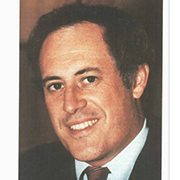
Pat Quinn
Born in Hinsdale in 1948, Quinn attended Fenwick High School, and earned a Bachelor’s Degree from Georgetown University and a law degree from Northwestern University. Before entering public service, Quinn was a tax attorney in private practice. Quinn was an outspoken activist for reform and good government. He led an effort to petition the 1970 Constitutional Convention to allow binding issue referenda to appear on Illinois’ ballots. Quinn also led a successful effort to reduce the size of the Illinois House of Representatives. He also was instrumental in the creation of the Citizens Utility Board, the non-profit organization that advocates on behalf of Illinois consumers. Quinn was first elected to public office as a commissioner on the Cook County Board of Tax Appeals, serving from 1982 to 1986. He served as revenue director in the administration of Mayor Harold Washington. Quinn was elected Treasurer of Illinois in 1990. During his time in office, he worked to pass whistleblower protection legislation into law. He served a single term as Treasurer. Quinn was elected as Lieutenant Governor of Illinois in 2002. Following the impeachment of Governor Blagojevich in 2009, Quinn assumed the role of Governor. He won a close race to retain the position in 2010, but was defeated in 2014
(1987-1991)
Jerome Cosentino
Jerome “Jerry,” Cosentino was born in Chicago in 1931. He worked as a trucker, and owned a transportation company. He was first elected to office as a Cook County Metropolitan Sanitary District Commissioner, serving for four years. In 1978, Cosentino was elected to the office of Illinois Treasurer, becoming the first Italian-American to be elected to statewide office in Illinois. After four years in the private sector, Cosentino again sought the office of state Treasurer and was re-elected in November 1986. After leaving office in January 1991, Cosentino was indicted for bank fraud. He pled guilty in April 1992, and was sentenced to serve nine months in home confinement. Upon completing this sentence, the former official left Illinois and moved to Naples, Florida, where he died in 1997.
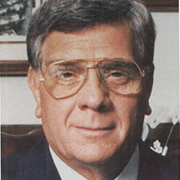
(1991-1995)
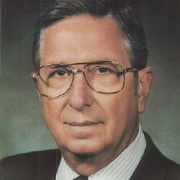
James Donnewald
James Donnewald was born in 1925 in Carlyle. Donnewald attended St. Louis University for his undergraduate education, and earned a law degree from Lincoln College of Law in 1949. He began his law practice in Breese, just outside of Carlyle. In 1948, he was elected Democratic precinct committeeman and in 1948 was elected as Carlyle Township Supervisor. He was elected to the Illinois House of Representatives in 1960 and re-elected in 1962. In 1964, he moved to the State Senate. During his tenure, he served as the assistant Senate majority leader. In 1982, he was elected as the state Treasurer. He was defeated in the Democratic Primary in 1986 by Jerome Cosentino, who was also his predecessor. He left office in 1987 and retired from public life. Donnewald died in 2009 at the age of 84.
(1979-1983)
Jerome Cosentino
Jerome “Jerry,” Cosentino was born in Chicago in 1931. He worked as a trucker, and owned a transportation company. He was first elected to office as a Cook County Metropolitan Sanitary District Commissioner, serving for four years. In 1978, Cosentino was elected to the office of Illinois Treasurer, becoming the first Italian-American to be elected to statewide office in Illinois. After four years in the private sector, Cosentino again sought the office of state Treasurer and was re-elected in November 1986. After leaving office in January 1991, Cosentino was indicted for bank fraud. He pled guilty in April 1992, and was sentenced to serve nine months in home confinement. Upon completing this sentence, the former official left Illinois and moved to Naples, Florida, where he died in 1997.

(1977-1979)
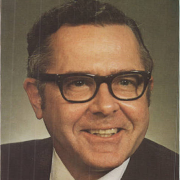
Donald R. Smith
Donald Smith was born in 1926. Smith went to York High School in Elmhurst, and in 1944 joined the United States Navy at the age of 18. After the war, he attended Loyola University, and John Marshall Law School. He began his career in Government in 1950 when he was appointed to the DuPage County Board of Review. In 1954 he became Chief Deputy Treasurer of DuPage, and then. In 1958 he was elected Treasurer of DuPage County in 1958. From 1965 until 1977, Smith served as chief fiscal officer in the office of the Illinois Treasurer under three State Treasurers: William J. Scott, Adlai E. Stevenson and Alan J. Dixon. In 1977, he was appointed Illinois Treasurer to fill the last two years of Alan Dixon’s term. Smith served until 1979. Smith was murdered in a mysterious incident in February 1982 in Chicago.
(1971-1977)
Alan J. Dixon
Alan Dixon was born in Belleville, Illinois in 1927. Dixon attended Illinois public schools and later earned his bachelor’s degree from the University of Illinois and his law degree from Washington University in St. Louis. During World War II, Dixon served in the United States Navy Air Corps. Dixon was first elected to public office in 1950, when he was sent to the General Assembly to represent his hometown. He served in the House for 12 years, before moving on to the State Senate, where he served for 8 years. He was the Democratic candidate for State Treasurer in 1970. He won that race, which remains noteworthy today for the involvement of a political prankster, a young Karl Rove. Rove stole letterhead from Dixon campaign, but was never charged with a crime. Dixon went on to win the election, and subsequent re-election, but vacated the office early to run for Secretary of State. He was elected as Secretary of State in 1976, and in 1980, successfully ran for U.S. Senate, a seat he held for two terms. Dixon passed away in 2014, one day shy of his 87th birthday.
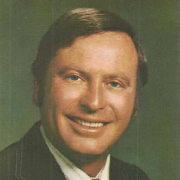
(1970-1971)
Charles Woodford
Charles Woodford was born in Sharon, Wisconsin, in 1931. Woodruff received his bachelor’s degree from the esteemed liberal arts institution, Beloit College. He started his business career in Chicago. He later served as assistant State Treasurer under Adlai Stevenson. When Adlai Stevenson was elected to the U.S. Senate, Woodford was appointed to fill the remainder of the term and served until Alan J. Dixon became the Illinois Treasurer in 1971. He chaired the 1973 Illinois Budget Task Force and helped with the implementation of the office of the Illinois Comptroller. He died in Hanover, Illinois in 2009.
(1967-1970)
Adlai Stevenson III
Adlai Stevenson III was born in Chicago in 1930. A descendant of a storied Illinois family, Stevenson’s Great Grandfather, Adlai I, was Vice-President of the United States under President Cleveland. His grandfather, Lewis, was Illinois Secretary of State, and his father, Adlai II, was Governor of Illinois, Democratic Nominee for President twice in 1952 and 1956, and U.S. Ambassador to the United Nations under Presidents Kennedy and Johnson. Stevenson joined the U.S. Marines and took part in the Korean War, and continued to serve in the Marine Reserves until 1961, exiting service with the rank of Captain. He received a law degree from Harvard in 1957, and began his legal career as a clerk for the Illinois Supreme Court. His career as public servant began in 1964, with a run for U.S. Congress in an at-large seat. The election of 1964 was unique, no solution could be reached by the bipartisan commission that was attempting to reform the redistricting process, so candidates ran “At-Large.” Due to the strength of President Johnson’s victory over Barry Goldwater that year, and due to strong name recognition, Stevenson was elected to Congress. He served a single term, and was slated by the Democratic Party in 1968 to run for Treasurer. He won that contest, but did not fulfill the term. When Senator Everett Dirksen died in office in 1969, Stevenson ran successfully in a special election to fill the Dirksen vacancy. He assumed office shortly after his November 1970 victory. Stevenson was re-elected to the Senate in 1974, and declined to run again in 1980. In 1982 and in 1986, Stevenson was the Democratic nominee for Governor—losing both times to Jim Thompson. Since his time in the Senate, Stevenson has worked to promote U.S. interests in South Korean, Japan, and China. Stevenson lives with his wife in Libertyville.
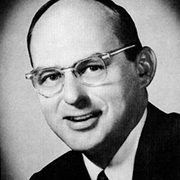
(1970-1971)
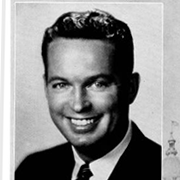
William J. Scott
William Scott was born in Chicago, Illinois, in 1926. Scott enlisted in the Naval Air Corps during World War II. After the war, he returned to Chicago where he attended Kent College of Law. He was an accomplished attorney, and was named a Special Assistant U.S. Attorney in 1959. In that position, he led a crackdown on organized crime in the Chicago area. Scott was also involved in banking, serving at one point as vice-president of the National Boulevard Bank. Scott was the Republican nominee for Treasurer in 1962. Partly due to his reputation fighting organized crime, Scott was successful in his bid for Treasurer. When his term expired, Scott ran for Illinois Attorney General, a position he held until he resigned in 1982. During his time as Attorney General, Scott distinguished himself as champion of the environment. William Scott faced controversy at the end of his time in office. He was brought up and found guilty on Tax Evasion charges, and served time in Federal Prison. He died in Chicago in 1986.
(1961-1963)
Francis S. Lorenz
Francis Lorenz was born in Chicago in 1914. Lorenz attended Chicago Public Schools, and got his Law Degree from DePaul University. He started his career in private practice, and in 1943 was appointed as an assistant corporation counsel. He pioneered the development and use of eminent domain laws to facilitate development in Chicago, playing a key role in major projects like O’Hare Airport, and the Chicago Skyway Toll Bridge. In 1956, he was slated as the Democratic Party nominee for Cook County Clerk of the Superior Court, and won his election despite a strong Republican vote to re-elect President Eisenhower that year. Lorenz lead efforts to modernize his office, and on the strength of his reforms was chosen again to represent the Democrats, this time as County Treasurer. Again, he was successful. Following the resignation of Treasurer Lohman, Lorenz was appointed to fill the remainder of his term. Lorenz ran for Treasurer in his own right in 1962, but was unsuccessful. He was later appointed by Governor Kerner as State Director of Public Works. He also served as a Judge of the Illinois Appellate Court from 1970-1992. He died in 2008 in Barrington at the age of 93.
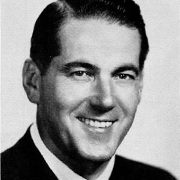
(1959-1961)
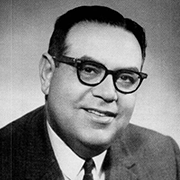
Joseph D. Lohman
Joseph D. Lohman was born in Denver, Colorado in 1910. He went to college at the University of Denver, and received a Master’s Degree from the University of Wisconsin, and continued his post-secondary education at the University of Chicago. Lohman studied sociology and criminology, and was an accomplished academic and social thinker. He held many academic and civic positions, as director of the American Prison Association, President of the Illinois Academy of Criminology, and as an editorial board member of the Journal of Criminal Law and Criminology. He was awarded a Medal of Freedom by the U.S. Army for “meritorious service as a civilian professional advisor on sociological and physiological matters,” for work he did during the Korean War. At one point, Lohman was retained by the Atomic Energy Commission to advise on improving race relations at U.S. nuclear facilities. In 1949, Governor Stevenson appointed Lohman as Chairman of the State Parole Board. In 1954, Lohman was the Democratic nominee for Cook County Sheriff. He won that race, and in 1958, was slated to be the Democratic candidate for Treasurer. A constitutional amendment that passed in 1954 changed the length of the term of Treasurer from two years to four years. Lohman was elected to the first four year term in the history of the office. Lohman ran unsuccessfully in the Democratic Primary for Governor against Otto Kerner in 1960. In 1961, he resigned his position to become the Dean of the School of Criminology at the University of California. Lohman lived the remainder of his days in the Golden State, passing away at the age of 58, in 1968.
(1957-1959)
Elmer J. Hoffman
Elmer Hoffman was born on his family’s farm near Wheaton in 1899. Hoffman attended the public schools in Wheaton. He enlisted in the Artillery Corps during the WWI and served in France. After the war, he helped operate his father’s farm as well as his own trucking firm. He was a Sheriff’s deputy in DuPage from 1930-1938, and was elected sheriff of DuPage County in 1938, where he served as Sheriff or Chief Deputy Sheriff until 1950. Hoffman, a staunch Republican, was his party’s nominee for Treasurer in 1952. He was successful, and ran again and won in 1956. In 1958, he was elected to Congress in Illinois’ 14th District. He served for two terms. Hoffman would go on to serve on the DuPage County Board. Hoffman passed away in 1976.
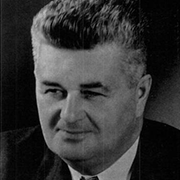
(1955-1957)
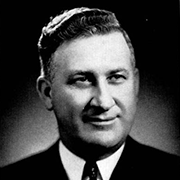
Warren Wright
Warren Wright was born in Murrayville in 1893. He served in the Army during World War I, and became Postmaster of Murrayville on his return. He was active from young age in the Republican Party, active in the Morgan County Republican Party, and also serving on the State Central Committee. In 1940, he was elected as State Treasurer. Wright used monthly radio broadcasts to publicize the work of the Treasurer and the current standing of the office. Wright was the Republican nominee for US Senate in 1942, and for Illinois Secretary of State in 1952, but was unsuccessful in those attempts. In 1954, Wright successfully ran again as his party’s nominee for Treasurer. Wright’s second term was not without controversy. Wright was questioned before a US Senate Committee about depositing practices made by his office in connection with the scandal surrounding Orville Hodge, the disgraced Public Auditor who plead guilty to embezzlement and forgery. Political struggles within the Republican Party threatened to sideline Wright’s candidacy for re-election, he had to run in a contested Republican Primary without Party support. Despite this, he won the party nomination, only to lose the 1958 General Election. He later ran unsuccessfully for U.S. Senate in 1960. Wright passed away in 1962.
(1953-1955)
Elmer J. Hoffman
Elmer Hoffman was born on his family’s farm near Wheaton in 1899. Hoffman attended the public schools in Wheaton. He enlisted in the Artillery Corps during the WWI and served in France. After the war, he helped operate his father’s farm as well as his own trucking firm. He was a Sheriff’s deputy in DuPage from 1930-1938, and was elected sheriff of DuPage County in 1938, where he served as Sheriff or Chief Deputy Sheriff until 1950. Hoffman, a staunch Republican, was his party’s nominee for Treasurer in 1952. He was successful, and ran again and won in 1956. In 1958, he was elected to Congress in Illinois’ 14th District. He served for two terms. Hoffman would go on to serve on the DuPage County Board. Hoffman passed away in 1976.

(1951-1953)
William Stratton
William Stratton was born in 1914 in Ingleside. His father, William J. Stratton was active in the Republican Party and in politics, having served as Secretary of State from 1929-1933. The young Stratton attended the University of Arizona, and graduated in 1934 with a degree in Political Science. Stratton entered public service himself in 1940, winning an election that year for one Illinois’ At-Large Congressional seats at the age of 26, making him the youngest member of the 77th Congress. Mr. Stratton served for two years, and in 1942, successfully ran as the Republican Nominee for State Treasurer. In 1944, Stratton joined the Navy and served in the Pacific Theatre. After the war, Stratton was elected again as an at-large Congressman from Illinois. Again, he served a single term, and in 1950, he was elected as State Treasurer for the second time. He won the Republican nomination for Governor in 1952, and defeated Lt. Governor Sherwood Dixon to become the youngest governor in America at that time. Mr. Stratton was re-elected Governor in 1956. Stratton was an ally of President Eisenhower, and was instrumental in the establishment of the interstate highway system in Illinois. He also played a major role in developing O’Hare Airport and McCormick Place. With the G.I. Bill, attendance to college skyrocketed, and Stratton presided over the expansion of the State University system, helping to establish the University of Illinois Chicago, and Southern Illinois University-Edwardsville. 1960 he ran for an unprecedented third consecutive term, but was defeated by Otto Kerner, Jr. He ran in the Republican primary for Governor in 1968 and was defeated by Richard B. Ogilvie. He remained active in civic life until his death in 2001.
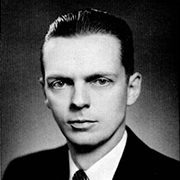
(1949-1951)
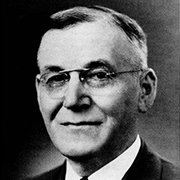
Ora Smith
Ora Smith was born in 1884 in New Market, Iowa. He grew up in Alexis and Kirkwood, Illinois and lived in Biggsville, Illinois most of his adult life. Smith was an Alderman in Kirkwood, and served as Justice of the Peace in Biggsville for 16 years. Smith was well respected, and was elected to six terms in the Illinois State House from 1937-1949. Smith was the Democratic Party nominee for Treasurer in 1948, a contest he won with strong Democratic turnout for President Truman. Smith served a single term, and was an unsuccessful candidate for Clerk of the Supreme Court in 1950. Smith remained active in Democratic politics, and stood for office once again in 1958, winning a closely contested election for State Senate in 1958. Smith died in 1965.
(1947-1949)
Richard Yates Rowe
Richard Yates Rowe was born in Jacksonville in 1888. Rowe came from a family with a history of civic involvement; his great-uncle was Richard Yates Sr., a founder of the Republican Party in Illinois and Governor during the Civil War. His son, Richard Yates Jr, for whom Howe is named, was also a former Governor. Rowe attended the University of Illinois at Urbana-Champaign where he earned a bachelors degree. He served in the U.S. Navy during World War I. After the war, Rowe became involved in veterans issues, as a local organizer of the American Legion post in Jacksonville. Mr. Rowe was active in Republican Party politics, and in 1943 he became Chairman of the Republican Party. In 1944, he was appointed to the position of Secretary of State, to fill out the remainder of the term of Edward Hughes, who died in office. In 1946, Rowe successfully ran for Treasurer, where he served a single term. Rowe died in Jacksonville, Illinois on March 19, 1973.
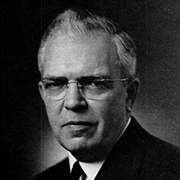
(1945-1947)
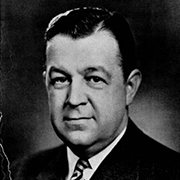
Conrad F. Becker
Conrad F. Becker was born in Red Bud, Illinois, in 1905. He was educated in the public schools of Red Bud, and later graduated from Sparta High School. As a young man, Becker worked in his family’s milling company, but he was best known in the area as a semi-professional baseball player, having pitched for a number of minor league teams. Becker was offered a contract with St. Louis Cardinals, but declined because of commitments to his family’s business. In 1927, Becker was elected Mayor of Red Bud and was subsequently re-elected twice. He was also active in the Republican Party, working his way from precinct captain to chairman of the Randolph County Republican Central Committee. From 1942 to 1944, Becker was the warden of the Southern Illinois Penitentiary in Menard. He was elected as Treasurer in 1944, and served a single term. Becker died in New Haven, Missouri in 1965.
(1943-1945)
William Stratton
William Stratton was born in 1914 in Ingleside. His father, William J. Stratton was active in the Republican Party and in politics, having served as Secretary of State from 1929-1933. The young Stratton attended the University of Arizona, and graduated in 1934 with a degree in Political Science. Stratton entered public service himself in 1940, winning an election that year for one Illinois’ At-Large Congressional seats at the age of 26, making him the youngest member of the 77th Congress. Mr. Stratton served for two years, and in 1942, successfully ran as the Republican Nominee for State Treasurer. In 1944, Stratton joined the Navy and served in the Pacific Theatre. After the war, Stratton was elected again as an at-large Congressman from Illinois. Again, he served a single term, and in 1950, he was elected as State Treasurer for the second time. He won the Republican nomination for Governor in 1952, and defeated Lt. Governor Sherwood Dixon to become the youngest governor in America at that time. Mr. Stratton was re-elected Governor in 1956. Stratton was an ally of President Eisenhower, and was instrumental in the establishment of the interstate highway system in Illinois. He also played a major role in developing O’Hare Airport and McCormick Place. With the G.I. Bill, attendance to college skyrocketed, and Stratton presided over the expansion of the State University system, helping to establish the University of Illinois Chicago, and Southern Illinois University-Edwardsville. 1960 he ran for an unprecedented third consecutive term, but was defeated by Otto Kerner, Jr. He ran in the Republican primary for Governor in 1968 and was defeated by Richard B. Ogilvie. He remained active in civic life until his death in 2001.

(1941-1943)

Warren Wright
Warren Wright was born in Murrayville in 1893. He served in the Army during World War I, and became Postmaster of Murrayville on his return. He was active from young age in the Republican Party, active in the Morgan County Republican Party, and also serving on the State Central Committee. In 1940, he was elected as State Treasurer. Wright used monthly radio broadcasts to publicize the work of the Treasurer and the current standing of the office. Wright was the Republican nominee for US Senate in 1942, and for Illinois Secretary of State in 1952, but was unsuccessful in those attempts. In 1954, Wright successfully ran again as his party’s nominee for Treasurer. Wright’s second term was not without controversy. Wright was questioned before a US Senate Committee about depositing practices made by his office in connection with the scandal surrounding Orville Hodge, the disgraced Public Auditor who plead guilty to embezzlement and forgery. Political struggles within the Republican Party threatened to sideline Wright’s candidacy for re-election, he had to run in a contested Republican Primary without Party support. Despite this, he won the party nomination, only to lose the 1958 General Election. He later ran unsuccessfully for U.S. Senate in 1960. Wright passed away in 1962.
(1939-1941)
Louie E. Lewis
Louie E. Lewis was born in 1893 on his family’s farm in Christopher. He was educated in public schools, and started his professional career as Teacher. He continued to teach for ten years, eventually branching out into newspaper publishing. Along with his brother, he would own two papers, the Sesser Herald and the Christopher Progressive. Lewis was elected to the General Assembly in 1932, and served three terms, and serving as Speaker of the House during his final term. In 1938, he successfully ran as the Democratic Party nominee for Treasurer. He served a single term. In 1940, he ran as the Democratic Nominee for Lt. Governor, but was defeated. Lewis later worked for the Illinois Division of Motor Vehicles as a clerk and eventually as chief commissioner of the office. He passed away in 1968.
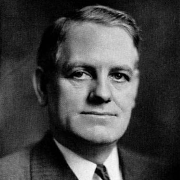
(1937-1939)
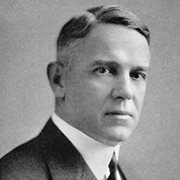
John C. Martin
John C. Martin was born in 1880, in Salem, Illinois, where his family resided since the early part of the nineteenth century. In 1932, he ran for Treasurer as a Democrat, and was swept into office during the first Presidential election of Franklin D. Roosevelt. He would be elected again as Treasurer in 1936. He was also a member of the Illinois Tax Commission and served as the Commission’s chairman in 1935 and 1936. He was also chairman of the Illinois Emergency Relief Commission from 1935 to 1938. He was elected to Illinois’ At-Large Congressional seat in 1938. In 1940, he ran unsuccessfully for State Auditor. He retired from public service and assumed leadership of the Salem National Bank. He died in California in 1952.
(1935-1939)
John Henry Stelle
John Henry Stelle was born in Mcleansboro in 1891. As a young man, he attended the Western Military Academy, and earned a law degree from Washington University in St. Louis. In 1917, he enlisted in the Army to fight in World War I. Stelle saw action in France, and attained the rank of Captain. Stelle was active in the Democratic Party, and served as delegate to many Democratic National Conventions. He was elected to the Treasurer’s office in 1934, serving a single term. In 1937, he became Lt. Governor after Henry Horner was elected to Governor in 1936. Horner died in office in 1940, and Stelle filled out the remainder of his term. Following his brief stint as Governor, Stelle became National Commander of the American Legion, where he was instrumental in drafting language for the G.I. Bill, which after the end of World War II was instrumental in establishing a strong middle class and strong economy that drove U.S. growth in the post-War era. Later in life, Stelle played an important role in John F. Kennedy’s Presidential campaign, helping to secure a strong turnout in Central Illinois for the candidate’s successful bid. Stelle passed away in 1962.
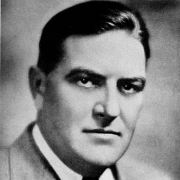
(1933-1935)

John C. Martin
John C. Martin was born in 1880, in Salem, Illinois, where his family resided since the early part of the nineteenth century. In 1932, he ran for Treasurer as a Democrat, and was swept into office during the first Presidential election of Franklin D. Roosevelt. He would be elected again as Treasurer in 1936. He was also a member of the Illinois Tax Commission and served as the Commission’s chairman in 1935 and 1936. He was also chairman of the Illinois Emergency Relief Commission from 1935 to 1938. He was elected to Illinois’ At-Large Congressional seat in 1938. In 1940, he ran unsuccessfully for State Auditor. He retired from public service and assumed leadership of the Salem National Bank. He died in California in 1952.
(1931-1933)
Edward Barrett
Edward Barrett was in Chicago in 1900. Barrett enlisted in the Army at the age of 17 and fought in World War I. He started his career in politics as precinct captain for his local Democratic Party organization. He was active in Chicago Democratic politics, and in 1930, secured his party’s nomination for Treasurer. He won the General Election, and served one term. In 1932, he was elected as State Auditor, a post he held until 1941. He returned to military service with the outbreak of World War II, serving as a Marine in the Pacific theatre. While serving in the Marines, Barrett was slated by the Democratic Party as the candidate for Illinois Secretary of State in 1944. Despite the fact that he did not campaign at all due to his service in the military, Barrett was elected to the position, making him the first person to serve in three different Illinois State Executive Offices. He lost his re-election bid to Secretary of State in 1952. Several years later, after Richard J. Daley’s was first elected as Mayor of Chicago, Barrett was appointed to fill the vacancy Daley had left as Cook County Clerk. Barrett was subsequently re-elected as Cook County Clerk three times. In September 1972, Barrett was indicted and later found guilty on a bribery and kickback scheme. Barrett managed to avoid incarceration after a prolonged legal fight that included the extraordinary measure of the U.S. Bureau of Prisons designating Barrett’s home as a penitentiary so he could serve his sentence from home. He was granted parole the day before his sentence was to begin, and died just over a year later, in 1977.
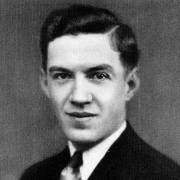
(1929-1931)
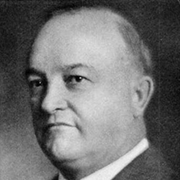
Omer N. Custer
Omer N. Custer was born in Fayette County, Pennsylvania, in 1873. As a youth, Custer moved to Galesburg, Illinois. In 1906 he was elected Knox County Treasurer. He served as postmaster in Galesburg under President Theodore Roosevelt’s administration. Governor Lowden appointed Custer to the State Industrial Commission. He was first elected State Treasurer in 1924, and was elected to the position again in 1928. He ran unsuccessfully for Governor against another former Treasurer, Len Small in 1932. Custer was a successful businessman, and publisher of the newspaper in Galesburg. He remained active in Republican Party politics and civic life until he died in 1942.
(1927-1929)
Garrett D. Kinney
Garrett De Forrest Kinney was born near Albany, New York in 1869. His family moved to Peoria in 1874 where Kinney was educated in Peoria public schools. He attended Cornell University in 1887, and returned to Peoria where he started a career in manufacturing. He later became director of the Commercial National Bank of Peoria. He was a political ally of Governor Deneen, active in the Republican Party as a member of the Republican State Central Committee and also served as State Chair of the Party. Kinney was elected as State Treasurer in 1926, and served for a single term. After he left office, a shortage of almost $175,000 was discovered in the Treasury. On the evening before he was scheduled to appear in court, Kinney shot himself in the head. The wound was not immediately fatal, and Kinney remained in the hospital for two more months before succumbing to his injuries. The year was 1933.
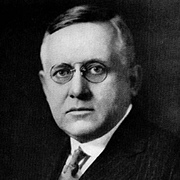
(1925-1929)

Omer N. Custer
Omer N. Custer was born in Fayette County, Pennsylvania, in 1873. As a youth, Custer moved to Galesburg, Illinois. In 1906 he was elected Knox County Treasurer. He served as postmaster in Galesburg under President Theodore Roosevelt’s administration. Governor Lowden appointed Custer to the State Industrial Commission. He was first elected State Treasurer in 1924, and was elected to the position again in 1928. He ran unsuccessfully for Governor against another former Treasurer, Len Small in 1932. Custer was a successful businessman, and publisher of the newspaper in Galesburg. He remained active in Republican Party politics and civic life until he died in 1942.
(1923-1925)
Oscar Nelson
Nelson was born in Sweden in 1874, and emigrated with his family to the United States in 1880. His family settled in Geneva where he grew up and attended public schools. He held a number of different jobs, and eventually worked his way up to become President of the Geneva State Bank, in Geneva. He was civically active in Kane County, as the head of the Kane County Bankers Association, and as a member of the Kane County Republican Party. He was elected to the office of Treasurer in 1922, where he served a single term. In 1924, he ran for State Auditor, and was re-elected in 1928. In 1931, Nelson was indicted on charges of malfeasance connected to the collapse of Waukegan State Bank, but the charges were later dropped. Nelson passed away in Geneva in 1951.
(1921-1923)
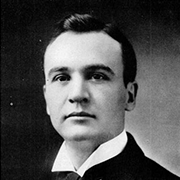
Edward E. Miller
Edward E. Miller was born in Creston, Iowa, in 1880. He moved to East St. Louis in 1892. He served as an aide to Congressman William Rodenberg and as a delegate to the Republican National Convention in 1912. Miller was the State Treasurer of Illinois from 1921 to 1923. Following his term as Treasurer, he was elected to Congress, where he served a single term. He entered public service again in 1942, as Director of Transportation for American Red Cross in St. Louis. He died in 1946.
(1919-1921)
Fred E. Sterling
Fred E. Sterling was born in 1869, in Dixon, Illinois. He was educated in the public schools at Dixon and later at Huron, South Dakota. As a young man, Sterling was a newspaper editor in Rockford, Illinois and started the Rockford Register-Gazette. He was active in the Republican Party, as a delegate to the Republican National Convention, a member of Illinois Republican State Central Committee, and the State Chair of the Republican Party. In 1917, Sterling was appointed to the Illinois Public Utilities Commission and then in 1919 was elected Illinois State Treasurer. He then served as Lieutenant Governor of Illinois from 1921 until 1933. He passed away in Rockford in 1934.
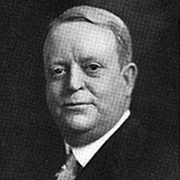
(1917-1919)
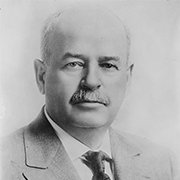
Len Small
Len Small was born in Kankakee County in 1862. Len Small has the dubious distinction of being the first Illinois Governor to be indicted in office. In his early life Small held several different jobs, teaching school, investing in real estate, and eventually owning a farm, a bank, and the daily newspaper in his hometown of Kankakee. He was first elected to public office as a State Senator in 1900. He served two terms, and in 1904, ran for State Treasurer. He served for two years, and was later appointed to a position with the U.S. Treasury in Chicago. In 1916, he successfully ran again for State Treasurer. He would later be elected Governor for two consecutive terms, serving from 1921-1929. It was during his second term as Treasurer where he was alleged to have embezzled $600,000, a charge he was indicted on while serving as Governor. Despite strong evidence, Small was found not guilty in a jury trial. A member of that jury, and two figures connected with organized crime were subsequently charged with jury tampering, but were not convicted. Small died in 1936.
(1915-1917)
Andrew Russel
Andrew Russel was born in Jacksonville, IL, in 1856. His father was an immigrant from Scotland. After receiving his education in the Jacksonville Business College and in Illinois College, Russel started his career as a banker and a businessman. He was partner of a banking firm, and was vice president of Ayers National Bank in Jacksonville. He served five terms as Treasurer of the city of Jacksonville, and for six years was chairman of the State Board of Pardons. He was delegate to Republican National Convention from Illinois. In 1909, he was elected to the position of Illinois State Treasurer, and six years later he was re-elected to the same position. He later served as Illinois State Auditor of Public Accounts from 1917 to 1925. After public life, he entered banking. Russel was Vice-President of the Ayers National Bank in 1932 when it collapsed. Russel was indicted and convicted for violating the National Banking Act. In 1934 he was sentenced for eighteen months, and died in prison later that year.
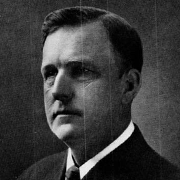
(1913-1915)
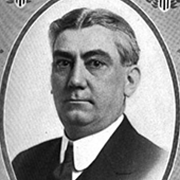
William Ryan, Jr.
William Ryan, Jr. was born at Danville in 1872 and graduated from St. Viator College in 1892. After college, he worked in his father’s carriage factory. Among the first to enlist in the Spanish-American War, Ryan served as a first lieutenant. In September 1898, he married Daisy Markle. An advocate of improving transportation in Illinois, Ryan was later nominated and elected State Treasurer in 1912.
(1911-1913)
Edward E. Mitchell
Edward E. Mitchell was born to a prominent family in Corinth in 1858. He helped establish the First National Bank in Carbondale in 1893, and was a prominent figure in the coal industry. Mitchell served a single term as Mayor of Carbondale, and was active in Republican Party politics as a State Central Committeeman. He was elected Treasurer in 1910 and served a single term. He died in Carbondale in 1938.
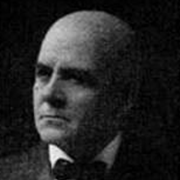
(1909-1911)

Andrew Russel
Andrew Russel was born in Jacksonville, IL, in 1856. His father was an immigrant from Scotland. After receiving his education in the Jacksonville Business College and in Illinois College, Russel started his career as a banker and a businessman. He was partner of a banking firm, and was vice president of Ayers National Bank in Jacksonville. He served five terms as Treasurer of the city of Jacksonville, and for six years was chairman of the State Board of Pardons. He was delegate to Republican National Convention from Illinois. In 1909, he was elected to the position of Illinois State Treasurer, and six years later he was re-elected to the same position. He later served as Illinois State Auditor of Public Accounts from 1917 to 1925. After public life, he entered banking. Russel was Vice-President of the Ayers National Bank in 1932 when it collapsed. Russel was indicted and convicted for violating the National Banking Act. In 1934 he was sentenced for eighteen months, and died in prison later that year.
(1907-1909)
John F. Smulski
John Smulski was born in 1867 in what is now Poland. His family immigrated to Chicago when he was young. He came from a middle-class background, and rather than follow in his father’s footsteps as a publisher, John decided to enter the legal profession. He graduated from Northwestern University in 1890 and established a practice in what was then known as the Polish Downtown neighborhood of Chicago, an area now known as Bucktown/Wicker Park. Smulski was a reformer and served several terms as an Alderman in Chicago. In 1903, Smulski was elected Chicago City Attorney. In 1906, Smulski successfully ran for Treasurer on the Republican ticket. In office, he instituted some of the first good governance reforms in the Office of the Treasurer. Prior to Treasurer Smulski, it was common practice for Illinois State Treasurers to retain some or all of the interest earned on investments of state monies. Smulski made this an issue during his election campaign and followed through on his promise. He returned over $70,000 in interest to the State in fiscal year 1907. This practice was made into law the following year. Smulski served only one term as Treasurer. He later ran unsuccessfully for Mayor of Chicago, and played a major role in organizing relief efforts for the Polish people during the First World War.
(1905-1907)

Len Small
Len Small, born in Kankakee County in 1862, holds the dubious distinction of being the first Illinois Governor to be indicted while in office. During his early years, he took on several jobs—including teaching, investing in real estate, and eventually owning a farm, a bank, and the daily newspaper in his hometown. Elected as a State Senator in 1900, he served two terms. In 1904, he ran successfully for State Treasurer, serving for two years, and was then appointed to a U.S. Treasury position in Chicago. By 1916, he again won the office of State Treasurer, continuing his political ascent. Later, he was elected Governor and served two consecutive terms from 1921 to 1929. Allegations of embezzling $600,000 arose during his second term as Treasurer, which led to his indictment as Governor. Although strong evidence was presented, a jury found him not guilty. Subsequent charges of jury tampering were brought against a juror and two individuals linked to organized crime; however, none were convicted. Small died in 1936.
(1903-1905)
Fred A. Busse
Fred Busse was born in Chicago in 1866. His father, Gustav, was a Union Army captain in the Civil War. Busse worked for his father’s hardware business as a young man before launching his own ventures. Busse was active in Chicago Republican politics and held numerous positions in Cook County before serving in the legislature as both a State Representative and a State Senator. In 1902, he was elected State Treasurer. He served a single term. Busse would later be appointed by President Theodore Roosevelt as Postmaster General of Chicago, a position with significant political clout. In 1907, Busse was elected Mayor of the City of Chicago. The Busse Woods Forest Preserve in Cook County is named after him. While Mayor, Busse clandestinely married a woman named Josephine Lee. Josephine was African American, and the first African American First Lady of Chicago.
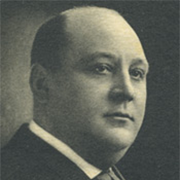
(1901-1903)
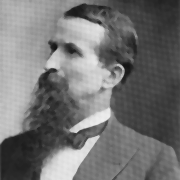
Moses O. Williamson
Moses O. Williamson was born July 14, 1850, on a boat crossing the Atlantic Ocean. His parents were Swedish emigrants making the voyage to America. The Williamson family settled in Knox County. As a young man, Moses began an apprenticeship as a harness maker and eventually bought out the firm’s owners. Williamson was active in civic life in Knox County, serving as justice of the peace, town clerk, and councilman in Wataga. He was also elected as Knox County Treasurer. He co-founded the Swedish-American League of Illinois and was elected its President in 1897. In 1900, Williamson was elected as a Republican to a single term as Treasurer. He died in Galesburg in 1935.
(1899-1901)
Floyd K. Whittemore
Floyd Whittemore was born in New York State and moved to the Sycamore area with his parents at a young age. As a young man, Whittemore decided to study law, but entered government service when Treasurer Beveridge hired Whittemore as Clerk in the office. Whittemore continued in banking after his stint in the Treasurer’s office and was later appointed to a position with the U.S. Treasury in Chicago. He would also serve as Assistant State Treasurer to Treasurer Wulff. He ran as a Republican in 1898 and won. He served a single term. Whittemore died in 1907.
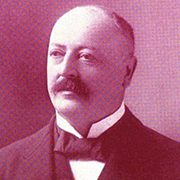
(1897-1899)
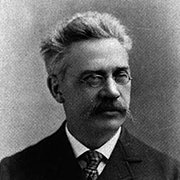
Henry L. Hertz
Henry Hertz was born in 1847 in Copenhagen, Denmark, to German-speaking parents. He studied medicine at the University of Copenhagen for several years before immigrating to the United States in 1869. He settled in Chicago, where he held various jobs. In 1884, he was elected as Coroner of Cook County. In 1896, Hertz was elected to State Treasurer on a Republican ticket. He served a single term as Treasurer.
(1895-1897)
Henry Wulff
Henry Wulff was born in Germany in 1854. He immigrated to Chicago in 1863. He was elected Cook County Clerk twice. In 1894, Wulff successfully ran for State Treasurer as a Republican. He served a single term. Wulff passed away in 1907.
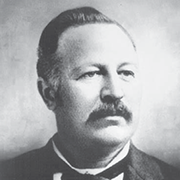
(1894-1895)
Elijah P. Ramsay
Elijah Ramsay was the son of the late Treasurer Rufus Ramsay. Elijah had served as Deputy Treasurer under his father, and at the time of his father’s passing in early November of 1894, was appointed by Governor Altgeld to fill the remaining weeks of his father’s term.
(1893-1894)
Rufus N. Ramsay
Rufus Ramsay was born in Clinton County in 1838. Ramsay studied law in college and was admitted to the bar in 1865. He abandoned the practice of law for banking and was active in Lebanon and Carlyle (St. Clair County). He was elected Clinton County Clerk in 1865 and later elected to two terms in the General Assembly. He successfully ran for State Treasurer in 1892 as a Democrat. A year after assuming the office, Ramsay passed away in 1894. After his death, it was discovered that over $350,000 in State Funds were missing from the Treasury. It was later determined that Treasurer Ramsay had unlawfully entered into an agreement with several banks. These banks issued the bond to Treasurer Ramsay for his office, with the understanding that state funds would be deposited with them.
(1891-1893)
Edward S. Wilson
Edward Wilson was born in Palestine, Illinois, in 1839. He studied law, and was admitted to the bar in 1861. He settled in Olney, where he established his law practice. In 1890. Wilson was elected to State Treasurer, the first Democrat to hold that position since the start of the Civil War. He served a single term.
(1889-1891)
Charles Becker
Charles Becker was born in Rockenhausen, Bavaria, on June 24, 1840. In 1851, his family immigrated to the United States and settled in Belleville, Illinois. On January 23, 1864, he married Louisa Fleischbein. Of their six children, five—Bertha, Casimir, Gustave, Arthur, and Ray—survived to adulthood. In 1872, Becker was elected Circuit Clerk and Recorder of Deeds and served two four-year terms. He became president of the Belleville Stone Works and the Pump & Skein Works during this period. The county Republican Party elected him chairman in 1884. Five years later, he was elected Illinois Treasurer, completing a two-year term. Becker died in Belleville on January 2, 1908, and was buried in Walnut Hill Cemetery.
(1887-1889)
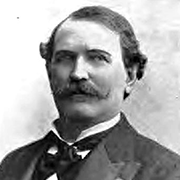
John Riley Tanner
John Riley Tanner was born in Indiana in 1844. When he was a boy, his family moved to the Carbondale area. At 19, Tanner enlisted in the Union Army with his three brothers and their father. The Tanner family suffered greatly during the war, losing Tanner’s father and two of his brothers. After the war ended, John became a farmer and businessman in Clay County. His involvement in public service increased: he was elected Sheriff of Clay County in 1870, became Clerk of the Circuit Court in 1872, and State Senator in 1880. By 1883, Tanner was appointed U.S. Marshall for the Southern District of Illinois, a federal position. Three years later, he ran for State Treasurer and won by large margins. Highly active in the Republican Party, he successfully ran for Governor in 1896. Tanner died shortly after finishing his term in office in 1901.
(1885-1887)
Jacob Gross
Jacob Gross was born in Germany in 1840. At 15, he immigrated to the United States in 1855. In Chicago, he attended school and learned the tinsmith trade. In 1862, he enlisted in the Union Army and fought at Chancellorsville, Gettysburg, Lookout Mountain, and other engagements. During the late spring of 1864 at the Battle of Dallas, Georgia, he was severely wounded and underwent four operations to amputate his right leg. After the war, he re-enrolled in school to continue his education. Following his studies, he served as deputy clerk of the Police Court in Chicago, then worked as a tax collector, and later became Clerk of the Cook County Circuit Court. In 1884, Gross was elected State Treasurer and served a single term. Afterwards, he became President of the Commercial Bank of Chicago.
(1883-1885)
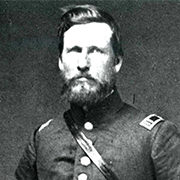
John C. Smith
John Corson Smith was born in Philadelphia in 1832. In 1854, he came west to Chicago to practice his trade of carpentry. He settled in Galena, where he married and started a family. In 1862 he volunteered for the Army with other volunteers from Galena and Jo Davies. He was chosen by these men to serve as their captain. Smith served valiantly in the war, participating in major battles in Tennessee, and later in Georgia, where he was injured at the battle of Kennesaw Mountain. He eventually earned the rank of Brigadier General through battlefield promotions. After the war he returned to Chicago to continue his business career. He was appointed to a number of boards and commissions, and even served as Chief Grain Inspector in Chicago. He was active in the Republican Party, being elected as delegate to two National conventions. He would be elected twice as State Treasurer, in 1878 and 1882. He was later elected Lieutenant Governor in 1884, he served in that position until 1889. Smith died in 1910.
(1881-1883)
Edward Rutz
Edward Rutz was born in Heidelberg, Germany in 1829. In 1847, he immigrated to the United States and settled in St. Clair County. He travelled extensively, touring through Iowa, Kansas, and California. In 1861, he entered the Union Army and fought in some of the most important battles of the war, at Antietam, Fredricksburg, and Chancellorville, among others. After the war, he worked in St. Louis and Tennessee, and travelled through the Southern states looking for opportunities. Finding none, he returned to St. Clair County, where he would be elected as County Surveyor. He went on to win several elections for County Treasurer. In 1872, he was elected State Treasurer, a post he would be elected to on two other non-consecutive occasions. He died in California in 1905.
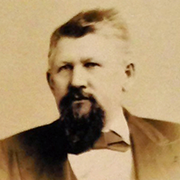
(1879-1881)

John C. Smith
John Corson Smith was born in Philadelphia in 1832. In 1854, he came west to Chicago to practice his carpentry trade. He settled in Galena, where he married and started a family. In 1862, he volunteered for the Army with other volunteers from Galena and Jo Davies. He was chosen by these men to serve as their captain. Smith served valiantly in the war, participating in major battles in Tennessee and later in Georgia, where he was injured at Kennesaw Mountain. He eventually earned the rank of Brigadier General through battlefield promotions. After the war, he returned to Chicago to continue his business career. He was appointed to several boards and commissions and even served as Chief Grain Inspector in Chicago. He was active in the Republican Party, being elected as a delegate to two National conventions. He would be elected twice as State Treasurer, in 1878 and 1882. He was later elected Lieutenant Governor in 1884 and served until 1889. Smith died in 1910.
(1875-1877)
Thomas S. Ridgway
Thomas Shannon Ridgway was born on August 30, 1826, in White County, Illinois. He was elected State Treasurer from 1874 to 1877. He was president of the First National Bank until his death in 1897. He died on November 18, 1897, in Shawneetown, Gallatin County, Illinois.
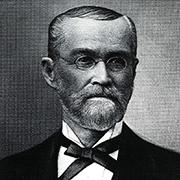
(1873-1875)

Edward Rutz
Edward Rutz was born in Heidelberg, Germany, in 1829. In 1847, he immigrated to the United States and settled in St. Clair County. He travelled extensively, touring through Iowa, Kansas, and California. In 1861, he entered the Union Army and fought in some of the war’s most important battles, including Antietam, Fredericksburg, and Chancellorsville. After the war, he worked in St. Louis and Tennessee and traveled through the Southern states in search of opportunities. Finding none, he returned to St. Clair County, where he would be elected as County Surveyor. He went on to win several elections for County Treasurer. In 1872, he was elected State Treasurer, a post he would hold twice, non-consecutively. He died in California in 1905.
(1869-1873)
Erastus N. Bates
Erastus Bates, born in Massachusetts in 1829, studied law in New York City before eventually traveling to Minnesota. He became active in civic life there, serving as a delegate to the State’s Constitutional Convention of 1856 and being elected to the Minnesota State Senate in 1857. By 1859, he had moved to Centralia and begun practicing law. When hostilities between the States erupted, Bates volunteered for service and received a commission as a Major in the 80th Illinois Volunteers. Rising through the ranks to Brigadier General, he was later captured and spent time as a Confederate prisoner of war. After hostilities ceased, Bates returned to Centralia to resume his law practice. He was elected to the General Assembly in 1866 and later became State Treasurer in 1868. Thanks to a new constitutional amendment that removed the prohibition against consecutive terms for Treasurers, Bates became the first State Treasurer to be re-elected by the people. He died in Minnesota in 1898.
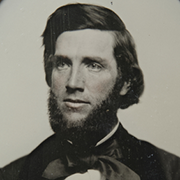
(1863-1865)
Alexander Starne
Alexander Starne was born in Philadelphia in 1813 and settled in Pike County in 1836. He served as County Commissioner and was elected to the General Assembly. In 1852, he was elected as Secretary of State. After he completed his term, he became President of the Hannibal and Naples Railroad. In 1862, he was elected as State Treasurer. He served a single term as Treasurer. He would later be elected to the State Senate. He died in Springfield in 1886.
(1859-1863)
William Butler
William Butler was born in Kentucky in 1797. As a young man, he served as a messenger for the Governor of Kentucky during the War of 1812. After the war, in 1828, he moved to the Springfield area. Eight years later, in 1836, he was appointed Clerk of the Circuit Courts. Later, Butler distinguished himself during an investigation into corruption allegations against a previous Governor. In 1859, Governor Bissell appointed him to fill the vacancy left by Treasurer Miller. Throughout his many years in Springfield, Butler was an ardent supporter of Abraham Lincoln and reportedly let Lincoln live with him rent-free while Lincoln was a state legislator. Butler died in Springfield in 1876, and Camp Butler National Cemetery, located near Springfield, is named in his honor.
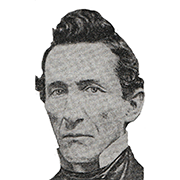
(1857-1859)
James Miller
James Miller was born in Virginia in 1795. When he was 16, his family moved to Kentucky, where he was elected County Sheriff four years later. However, Miller became disenchanted with slavery and, as a result, decided to leave the slave state of Kentucky for Illinois in 1835. Once in Illinois, he established himself as a successful merchant and, in 1856, was elected State Treasurer. However, in 1859, rumors and innuendos concerning charges of defalcation caused Miller to resign. To address these concerns, Miller published a full accounting of his office and his resignation, and there is no evidence of any malfeasance today. Throughout his life, Miller was a devoted member of the Methodist Church and remained active until he died in 1872.
(1848-1857)
John Moore
John Moore was born in Lincolnshire, England, in 1793. He immigrated to America in 1830 and settled in Bloomington. Moore earned the nickname “Honest John” and was elected to the legislature in 1838. Moore recruited volunteers from Illinois to fight in the Mexican-American War and served as a Lieutenant Colonel in the conflict. He would serve as Lieutenant Governor and was later selected by the legislature to fill the remainder of Milton Carpenter’s term. In 1850, Moore became the first Illinois State Treasurer to be voted into office by the electorate.
(1841-1848)
Milton Carpenter
Milton Carpenter was born in Kentucky and moved with his family to Illinois as a young boy. After serving in the Blackhawk War, he was elected to the General Assembly. He was elected by the legislature to fill the post in 1841 and served in that position until he died in office in 1848.
(1837-1841)
John D. Whiteside
John D. Whiteside was a member of the prominent Whiteside family, for which the Illinois County is named. He served as both a State Representative and a State Senator before becoming State Treasurer. In addition to his political career, Whiteside played a small role in the so-called Lincoln-Shields Duel, in which the Illinois Auditor of Public Accounts, James Shields, took offense from a sarcastic letter to the editor written by Lincoln. At that time, Whiteside was to serve as Shield’s second; however, a non-violent solution was reached, and the duel did not take place. Whiteside died in 1850.
(1836-1837)
Charles Gregory
Charles Gregory fulfilled the remainder of the term for the Treasurer’s office that was vacated by Treasurer Dement. Treasurers were required to post a bond as a qualification for office, and the bond Gregory posted lists a young State Representative, Abraham Lincoln, as one of its guarantors.
(1831-1836)
John Dement
John Dement was born in Tennessee in 1804. He was elected Sheriff of Franklin County in 1826 and also served as State Representative from 1829 to 1831. He served in the Blackhawk War with distinction. He was elected by the legislature to the office of Treasurer in 1831 and served until 1836, when he returned to the legislature to oppose moving the State Capitol to Springfield. He was a delegate to three state constitutional conventions. President Van Buren appointed him to the Federal position of Receiver of Public Moneys in 1837. He served for four years until President Taylor declined to reappoint him, and four years after that, he was reappointed by President Pierce until that office was abolished. Dement passed away in 1883. His son, Henry Dement, would go on to serve two terms as Illinois’ Secretary of State from 1880 to 1888.
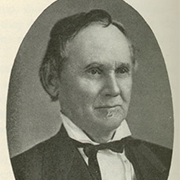
(1827-1831)
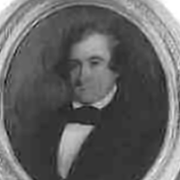
James Hall
James Hall, born in 1973 in Philadelphia, was a soldier in the War of 1812, a lawyer and circuit judge, a newspaper and magazine editor, state treasurer of Illinois, a banker in Cincinnati, Ohio, and a writer of history and fiction. He died in 1868.
(1837-1841)
Abner Field
Abner Field was born in Kentucky. He served as Illinois Treasurer from 1823 until 1827. Field owned slaves, who he freed in 1830. He died in Galena in 1832.
(1819-1823)
R.K. McLaughlin
R.K. McLaughlin was Born in Virginia in 1779. He moved from Virginia to Kentucky at an early age, settling later in Belville in 1815. McLaughlin served in the War of 1812. After the war, he was a clerk in the territorial legislature. Governor Bond appointed McLaughlin to replace John Thomas. McLaughlin later served as both a State Representative and State Senator from the Vandalia area. He ran unsuccessfully for Governor against his nephew, Joseph Duncan, in 1834. He died in Vandalia in 1862.
(1812-1819)
John Thomas
Very little is known about John Thomas. Thomas was appointed to the position of Treasurer of the Illinois Territory in 1812 and served as the State’s first Treasurer for one year from 1818 until he died in office in 1819. Thomas was a lawyer from St. Clair County and was a delegate to the State’s first Constitutional Convention.
(1796-1803)
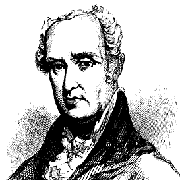
John Armstrong
John Armstrong was appointed to the post of Treasurer of the Northwest Territory by the U.S. Congress in 1796. Born in New Jersey, Armstrong served as an officer in the Continental Army in the Revolutionary War. He would serve in the U.S. Army in campaigns against Native American forces in 1790. He served as Treasurer of the Northwest Territory for seven years, and later as judge in the newly formed State of Ohio.

